There have been two baronetcies created for people with the surname Jenkinson, both in the Baronetage of England. The seventh holder of the first creation was elevated to the peerage as Earl of Liverpool in 1796, a title which became extinct in 1851.

There have been three baronetcies created for persons with the surname Burdett, two in the Baronetage of England and one in the Baronetage of Ireland. As of 2008, two of the creations are extant while one is dormant.
There have been three baronetcies created for persons with the surname Wilmot, one in the Baronetage of Ireland and two in the Baronetage of Great Britain. One creation is extant as of 2008.

The Baronetcy of Gresley of Drakelow was created in the Baronetage of England on 29 June 1611 for George Gresley of Drakelow Hall, Derbyshire who was later High Sheriff of Derbyshire and Member of Parliament for Newcastle-under-Lyme.

The Holte Baronetcy, of Aston in the County of Warwick, was a title in the Baronetage of England. It was created on 25 November 1611 for Sir Thomas Holte, of Aston Hall, then in Warwickshire. He was High Sheriff of Warwickshire in 1599 and had been knighted by King James I in 1603. He was succeeded by his grandson, the second Baronet. He was Member of Parliament for Warwickshire. The third and sixth Baronets also represented Warwickshire in Parliament while the fifth Baronet was Member of Parliament for Lichfield. The title became extinct on the death of the sixth Baronet in 1782 and the substantial estate was broken up, under an Act of Parliament of 1817, in order to meet the interests of the various claimants.
Peregrine Hoby, was an English landowner and member of parliament who sat in the House of Commons at various times between 1640 and 1679.

There have been two baronetcies created for the Pye family. Both are now extinct.

There have been five baronetcies created for members of the old established family of Peyton of Peyton Hall in the parish of Boxford in Suffolk, all of whom were descended from Sir Robert Peyton of Isleham in Cambridgeshire, grandson and heir of Thomas Peyton (1418–1484) of Isleham, twice Sheriff of Cambridgeshire and Huntingdonshire, in 1443 and 1453. All the baronetcies are extinct.
Godfrey Clarke, was an English landowner and politician who sat in the House of Commons from 1710 to 1734.
The Coke baronetcy of Longford, in the County of Derby was created in the Baronetage of England on 30 December 1641 for Edward Coke.
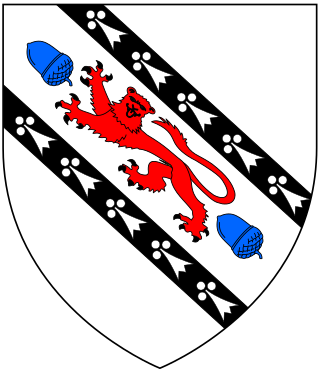
The Rodes Baronetcy, of Barlborough in the County of Derby, was a title in the Baronetage of England. It was created on 14 August 1641 for Francis Rodes, of Barlborough Hall, near Chesterfield, Derbyshire. The early family of Rodes was seated in Nottinghamshire. A William Rodes acquired an estate in Derbyshire by marriage. Sir Francis Rodes built Barlborough Hall in 1583–4. The first Baronet was his grandson. The title became extinct on the death of the fourth Baronet in 1743, when the estates passed to his sister's heirs, the Heathcotes and Heathcote-Rodes families.
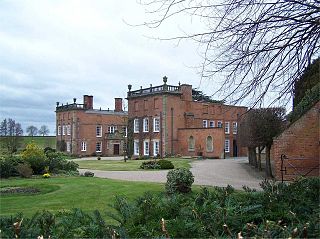
Longford Hall is a 16th-century country house at Longford in the Dales district of Derbyshire, England. It is a Grade II* listed building.
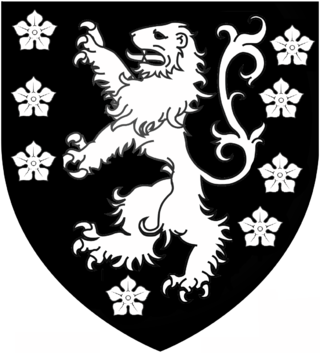
Two unrelated baronetcies have been created in the surname of Clifton.

The Baronetcy of Cockayne of Ashbourne was created in the Baronetage of England on 10 January 1642 for Aston Cockayne, Lord of Ashbourne Hall, Derbyshire and Pooley Hall, Polesworth, Warwickshire.

Sir Thomas Burdett, 1st Baronet was an English Sheriff and baronet.
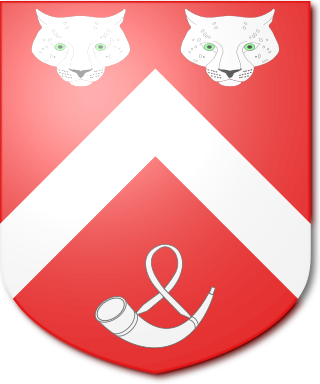
There have been four baronetcies created for members of the Slingsby family who settled at Scriven Hall, Scriven, Knaresborough, Yorkshire in the 14th century.

Sir Simon Degge (1612–1703) was High Sheriff of Derbyshire and served North Wales as a Justice. It was said that he served his year as sheriff in "barrister robes and with a sword by his side". Degge was a Royalist and wrote a reference book on the law and rights of a parson called the Parson's Counsellor.... The book includes advice on the income from a glebe, Jus patronatus and the crime of Simony.

The Hampson Baronetcy, of Taplow in the County of Buckingham, was a title in the Baronetage of England. It was created by King Charles I on 3 June 1642 for Thomas Hampson, second son of Sir Robert Hampson (1537-1607) one of the two Sheriffs of the City of London in 1599, knighted by King James I in 1603. The third Baronet sat as Member of Parliament for Chipping Wycombe in 1685. The tenth Baronet was an entomologist. The title became extinct on the death of the twelfth Baronet in 1969.
There have been five baronetcies created for persons with the surname Wentworth, four in the Baronetage of England and one in the Baronetage of Great Britain. All creations are extinct.
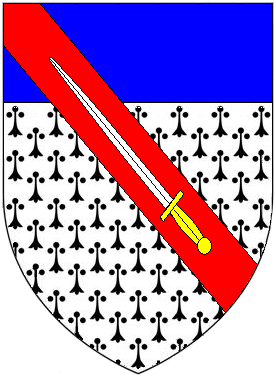
Thomas Gladwin of Tupton Hall, in the parish of Wingerworth near Chesterfield, Derbyshire, was Sheriff of Derbyshire in 1668.











